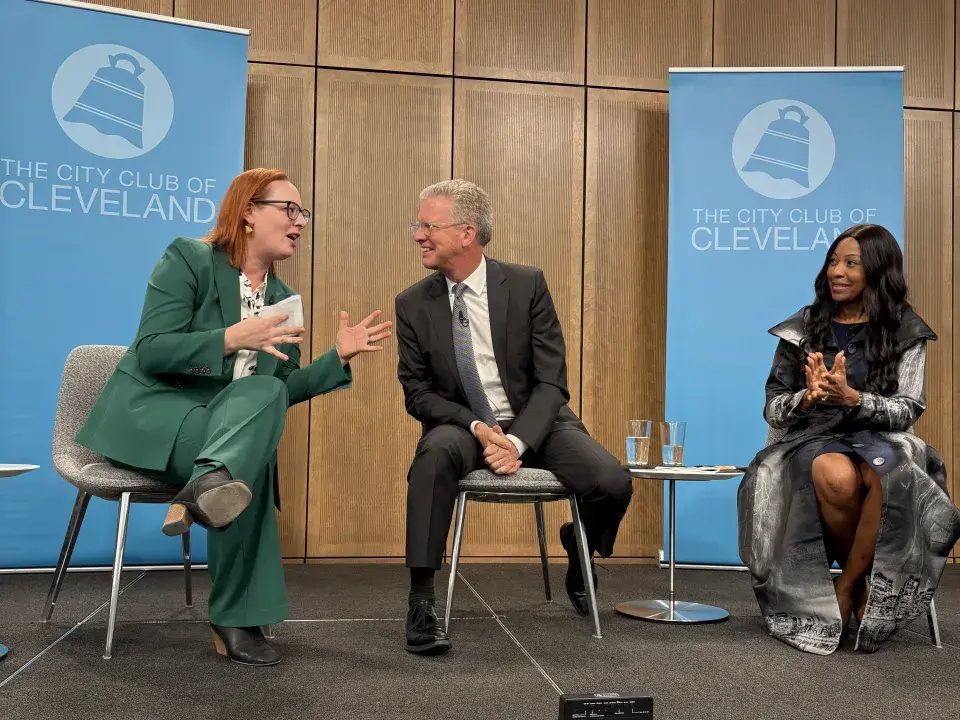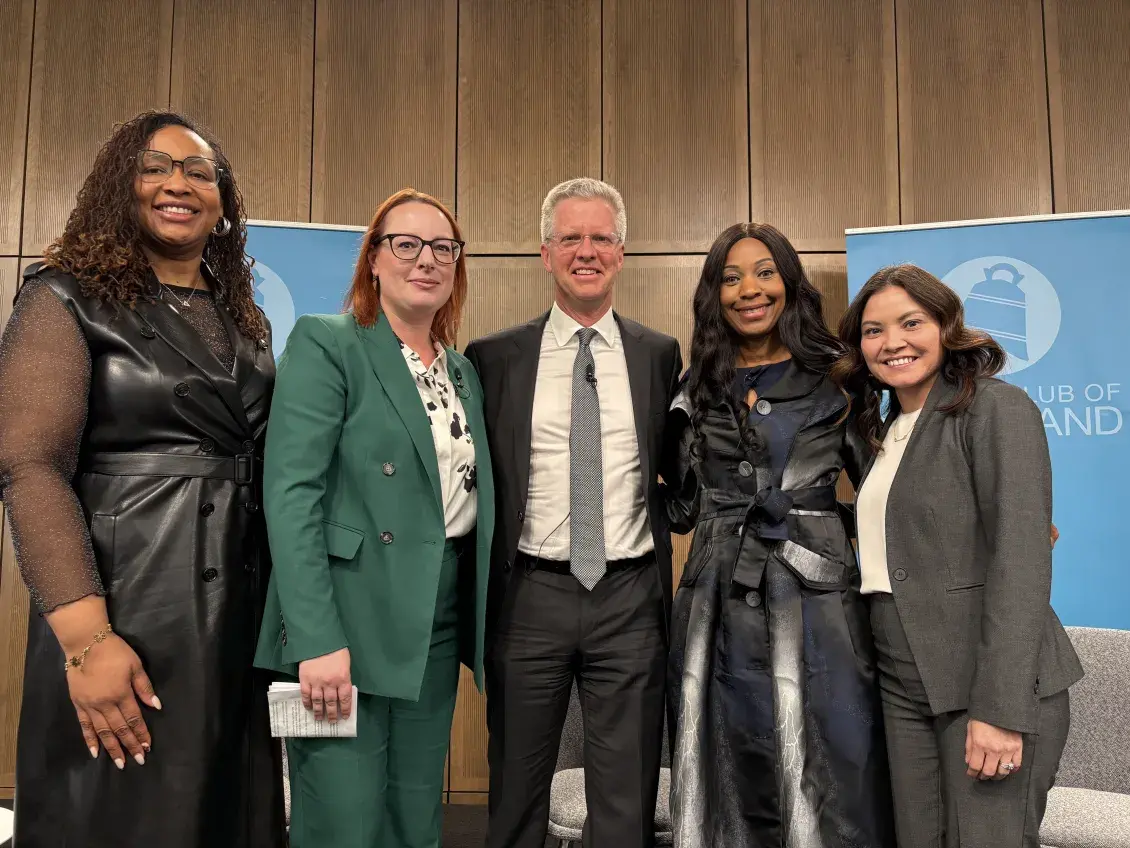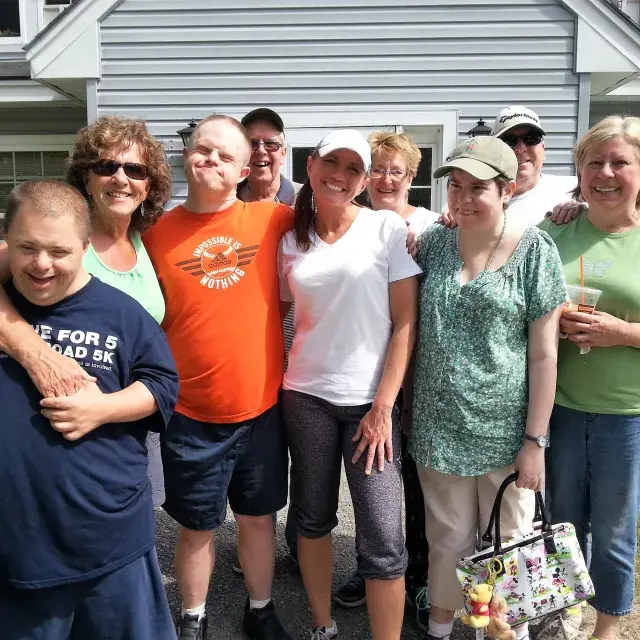Perspectives may differ, but the numbers don’t lie: Nationwide, we are short roughly 7 million homes, while homelessness has increased 30% across the country over the past two years. In Ohio, some 45% of the population is burdened by housing costs that take up more than 30% — and sometimes more than 50% — of annual incomes.
That was a shared message from Enterprise CEO and President Shaun Donovan and Ohio Republican State Senator Michele Reynolds in a recent discussion that touched on key drivers behind the country’s housing crisis as well as practical solutions that transcend partisan divides. The key: building a bipartisan movement with leaders at every level — federal, state, and local — committed to taking bold, innovative action to turn the crisis into an opportunity for transformation.
“We're coming together because of this crisis,” said Reynolds, who shared the stage with Donovan at a City Club of Cleveland forum. “When we make it a Democratic agenda or Republican agenda, we’re missing the very essence of what it means to be a human being that deserves to have an affordable, accessible, and safe place to live.”
Donovan said that in three decades he has never seen the crisis as acute. “But what is different than anything I've seen in my career is not just the depth of the crisis, but the breadth of the crisis. It's urban, it's rural, it's tribal —it’s everywhere in our country.”
Donovan and Reynolds stressed that the housing crisis is not just about affordability but also economic mobility, workforce development, and even political polarization, noting that where people can afford to live increasingly correlates with their political point of view and economic opportunities.
When we make it a Democratic agenda or Republican agenda, we’re missing the very essence of what it means to be a human being that deserves to have an affordable, accessible, and safe place to live.
Michele Reynolds, R, representing Ohio's 3rd Senate District
Solutions Require Innovation and Collaboration
Despite the dire statistics, both Donovan and Reynolds pointed to emerging bipartisan momentum for change. Across the country, state and local leaders are experimenting with solutions, such as property tax stability zones, incentives for faith-based organizations to develop housing, and zoning reforms to promote density and mixed-use development.
In Ohio, Enterprise is an active member of the Home Matters to Ohio coalition working to advance state policies that would increase and incentivize housing supply in Ohio, such as expanding the Ohio Low Income Housing Tax Credit and safeguarding the future of the Ohio Housing Trust Fund. Many of these proposals align with recommendations from the Senate Select Committee on Housing, chaired by Senator Reynolds, which recently put out their report, Housing Reimagined: Building a Solid Foundation for Ohio’s Future.
Senator Reynolds also talked about the "Promised Land" bill she’s drafting, which would offer tax incentives for faith-based and nonprofit organizations to develop affordable housing on underutilized land. Donovan echoed the importance of leveraging existing assets, such as repurposing vacant malls and offices into housing. He pointed to Los Angeles, where accessory dwelling unit (ADU) reforms have resulted in significant new housing development.
Donovan said: “We have state legislatures and local communities that have passed bills that are really starting to move the needle…one great example is office conversion.” Enterprise recently did a study that showed that just 10% of the vacant mall space in the country could be transformed into 700,000 units of housing, Donovan added.
Expanding housing supply is key to increasing housing affordability and effectively addressing homelessness. Drawing on her experience as a housing provider focused on preventing homelessness, Reynolds shared, "Do what you love to fight what you hate."
At a time when we have record rates of homelessness, we know this is a solvable problem.
Shaun donovan, Enterprise ceo and president
Enterprise convenes partners in Cuyahoga County to end chronic homelessness through permanent supporting housing, and Donovan pointed to the Lotus — developed by EDEN and CHN Housing Partners to serve young adults experiencing homelessness — as a model for this strategy. The design, policies, and services for the Lotus were directly shaped by young adults with lived experience to ensure future residents would have the support needed to remain stably housed.

The Role of Federal Policy and Funding
While state and local innovations are critical, significant federal action is also needed to address the housing crisis at scale. The expiration of President Trump’s hallmark tax law provides housing and community development advocates with a lever to advance key priorities like expanding the Low-Income Housing Tax Credit (LIHTC), which remains the nation’s most important tool for financing affordable housing, Donovan said. Expanding LIHTC, as proposed in bipartisan tax legislation, could result in a significant increase in affordable housing development nationwide. Additionally, reforming Opportunity Zones to ensure they support housing development in underserved communities could further boost housing supply.
Moving Forward: A Call to Action
Donovan and Reynolds stressed that the potential of public-private partnerships, regulatory reforms, and community-driven solutions offers a path forward for addressing the housing crisis.
Donovan said: “As a country we can put money into building housing, we can have more low-income housing tax credits…All of those capital tools can help housing get built.” At the same time, “there are millions of families in this country that work full-time and still can't afford to pay rent needed to operate the housing unit. We are always going to need a system that balances capital tools for building housing with safety net services and economic opportunity programs to ensure everyone has a home they can afford.”
Watch a recording of the full City Club of Cleveland forum, From Crisis to Opportunity: Strategies for Housing Affordability and Ending Homelessness.



